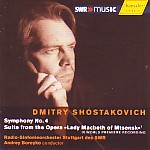This live recording, before a very well-behaved audience, is a good, not great performance of Shostakovich’s Fourth Symphony. Conductor Andrey Boreyko starts off very promisingly, with nicely in-your-face brass playing at a smart tempo. The problems all occur in the long stretches of quiet music, where Boreyko reveals an unfortunate tendency to slow down and let tension drain away. This is particularly evident in the first movement’s contrasting waltz music and in bits of the finale (though once again the noisy concluding chorale is quite impressive).
The coupled three-movement suite from Lady Macbeth is billed as a “world premiere recording”, which it most certainly is not. Record labels in this day and age should never, ever make this claim. Not only has it been done once or twice previously (most recently by Sanderling on DG), but the music is the same as that in the better-known suite, only there’s less of it. That said, it’s extremely well played and it makes a very sensible coupling for the symphony. The sound is fine too, but you can do better in the Fourth by sticking with Previn (EMI), Järvi (Chandos), or if sonics aren’t an issue, Kondrashin (Melodiya).
































